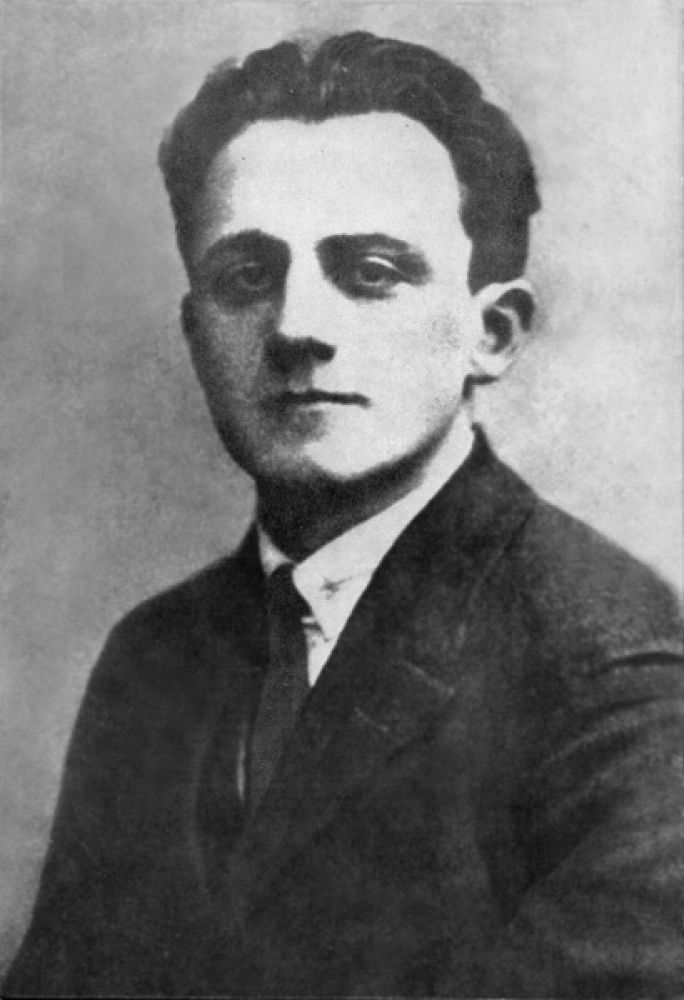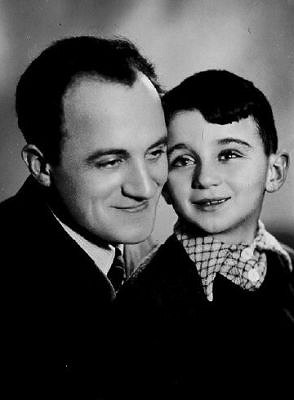- News
- Events
- Oneg Shabbat
- Collections
- Research
- Exhibitions
- Education
- Publishing Department
- Genealogy
- About the Institute
- Bookstore


We will remember Emanuel Ringelblum as the founder of unique in occupied Europe the Underground Archive of the Warsaw Ghetto, gathering all of the important information about the fate of the Polish Jews. He created the memory of the nation. He accompanied his people. He refused to go to the East after the outbreak of the war. He did not want to leave the Warsaw Ghetto.
He referred to the Archive as the conscience of the ghetto. The collection of the documents was to show not only the fate of the Jews, but also, what he emphasised, their honour and strength in the suffering. What "Oneg Shabbat” did, in time began to resemble pious work of a chevra kadisha, a burial society. Ringelblum made sure that the death of the nation was thoroughly documented and the memory of the murdered was venerated. He hoped that the testimonies hidden in the ground would after years shout out the truth about the Holocaust.
Emanuel Ringelblum was a Marxist, radical leftist, activist of the Jewish Communist Labour Party (Poalei Zion). He loved Jewish culture and history and was devoted to the Yiddish language, which was spoken by the masses. For many years, he taught in Jewish gymnasiums. An academic career was not an option for him, a Jew. He believed in the necessity of developing the proletarian culture. In his research he showed correlation between the fates of the Poles and the Jews as well as the Polish and Jewish cultures. He organized a nationwide campaign for the collection of source documents of the Jewish communities. He encouraged to conduct research on the history of Jewish architecture and material culture of the Jews. He organized, particularly effective, the Warsaw branch of YIVO — The Yiddish Scientific Institute. He engaged provincial Jewish intellectuals to write local history and he collaborated with the Jewish Tourist Association, encouraging people to get to know the country, including the "Jewish places”, and to be close to nature.
He was mission-oriented and engaged in social matters. He organized, inter alia, education for adults, folk high schools for workers. In 1930, he supported a credit association, offering low interest loans, which were given to the inhabitants of 870 towns. When in 1938, Jews-Polish citizens were expelled from Germany, within a few weeks, on behalf of Joint, he organized in Zbąszyń an efficient camp for displaced people. In the ghetto, he was one of the main coordinators of the Jewish Social Self-Aid; he organized "house committees”, kitchens for the starving, charitable groups.

He appointed in the ghetto a conspiratorial research group called "Oneg Shabbat” — joy of Saturday — consisting of people of various beliefs and political affiliations, from orthodox Jews, activists of Poale Zion Left to Bund followers and communists. The Archive included interviews, testimonies, information given by various people from as many circles and places as possible. It has to be added that each document obtained by the Archive passed through his hands. With his team, he would set aims and techniques of the research; he himself decided on the co-workers.
He knew he had to write down the history of all those suffering, above all, the masses, the poor and the weak. He wrote history for his nation and with the participation of his people. Science was to be something completely popular, made for the masses and using the knowledge of the masses.
He left behind many books and articles, inter alia, about the role of Jews in the Kościuszko uprising. He also published partial history of the Jews of Warsaw. He wrote two of his most important works during the war: "Notes from the Warsaw Ghetto”, a remarkable work written using the language of an outside observer, and "Polish-Jewish relations during the Second World War.” The latter, a heartbreaking and painful work, was written already in hiding, in a bunker in Grójecka Street.
Ringelblum remains someone exceptional for me. He combined, what is unusual today, social and political work with research. He was deeply loyal to his party, but he was still ready to work with anyone who had a good will. Being an academic was his true vocation, but he did not want to separate himself from the world with a wall of academism. He wanted solid study of history to be a result of work of the broadest groups. He believed in democratic socialism and justice; he dreamt about the world without anti-Semitism. He was someone who bothered, built subsequent institutions with his own energy. He must have been liked and respected. He created the archive of the underground ghetto, a work which became a property of the whole Jewish nation, just as he had wished. There was no more place for political or ideological disputes. Simply, it was Jewish intelligentsia that met while working on documenting the Holocaust. Almost all of the members of the "Oneg Shabbat” group were murdered. We do not know all the names of the co-creators of the Archive. Neither do we have photos of them.
Ringelblum with his wife and son were denounced by a Polish szmalcownik on 7th March, 1944 and were transported to Pawiak. A few days later they were shot dead among the ruins of the ghetto. We do not know their burial place. We do not know the date of their deaths.
We know that Ringelblum, Patron of our Institute, is alive through his work. The headquarters of the JHI is the building where he worked and which survived despite the war. Our collections include the Archive, which is carefully preserved. It is meticulously edited and published. In this way Ringelblum and his works are still among us.